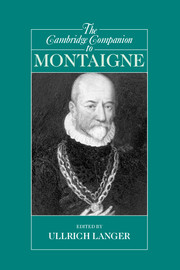Book contents
- Frontmatter
- 1 Introduction
- 2 Montaigne’s political and religious context
- 3 Montaigne’s legacy
- 4 Montaigne and antiquity
- 5 The Essays and the New World
- 6 Justice and the lawlaw: on the reverse side of the Essays
- 7 Montaigne and the notion of prudence
- 8 Montaigne and the truth of the schools
- 9 The investigation of nature
- 10 Montaigne and skepticism
- 11 Montaigne on moral philosophy and the good life
- Bibliography
- Index
2 - Montaigne’s political and religious context
Published online by Cambridge University Press: 28 May 2006
- Frontmatter
- 1 Introduction
- 2 Montaigne’s political and religious context
- 3 Montaigne’s legacy
- 4 Montaigne and antiquity
- 5 The Essays and the New World
- 6 Justice and the lawlaw: on the reverse side of the Essays
- 7 Montaigne and the notion of prudence
- 8 Montaigne and the truth of the schools
- 9 The investigation of nature
- 10 Montaigne and skepticism
- 11 Montaigne on moral philosophy and the good life
- Bibliography
- Index
Summary
Montaigne was born in 1533, during the reign of François I (1515-47), but he did not begin writing his Essays until after his “retirement” to his estate in 1571, as a mature man. France seemed then a country very different from the heady days of François I. For much of the second half of the sixteenth century, and especially so in the southwest, it was a “disturbed and sick state,” as Montaigne himself remarked (iii.8, F719, V941). Many factors contributed to this experience and to this perception, most obviously the wars of religion (1562-98), which were fought intermittently, with varying intensity and with varying geographical extension. However, the religious conflict between Huguenots and Catholics was only one of the factors inducing a sense of fragility and contingency in French society. The sixteenth century witnessed a remarkable set of political and religious changes, fuelled by an early economic expansion which produced exceptional social mobility at the upper levels (from which Montaigne's own family benefited). On the political level, the religious conflict enabled a critique and a corresponding defence of the monarchy which in theory at least became a guarantor of order in a troubled society. Montaigne's political functions as magistrate, mayor of Bordeaux for two successive terms (1581-5), and administrator of his domain, and his involvement in mediation attempts between the warring factions and in diplomatic missions at the highest level, exposed him both to the local consequences of conflict and to the issues relevant to the direction of the ship of state.
- Type
- Chapter
- Information
- The Cambridge Companion to Montaigne , pp. 9 - 26Publisher: Cambridge University PressPrint publication year: 2005
- 8
- Cited by

